|

My Medieval Herb Garden
My herb garden
with medieval herbs and flowers! A new project for July 2020.
Organic gardening, medieval plants and flowers, what they were
used for in the medieval period
and what I'm using them for. Images from my own garden.
Notes updated as I harvest. This page is a work in progress.


Currently planted:
wormwood, chamomile, feverfew, oregano, rue, parsley, lemon
geranium, nasturtiam, chives, garlic, onions, strawberries,
violets, roses, rosemary, sweet william, elder, salvia, catmint,
borage, comfrey, soapwort, sage, evening primrose, mustard,
peas, lavender, aloe vera, raspberry, lavender, basil, coriander,
ivy, lady's mantle, mint, lemon.
To get: fennel (Tacuinum Sanitatis, useful for
menstruation)
Aloe
Aloe
vera
Current Status: established
Uses:
- cures worms.
- cures stomach fevers.
- cures coughs.
- cures jaundice.
- Hildegard von Bingen, Physica:
For strong daily
stomach fevers, once should make a plaster with aloe on
hempen cloth. When placed over the stomach and navel,
the fever will cease. It's odor strengthens a person internally;
it purges a similar affliction in the head.
One who has a cough should put an aloe plaster on his
chest so that he can smell the odour. The cough will cease.
One who has jaundice should place aloe in cold water and
drink it in the morning and when he goes to bed. He should
do this three or four times and he will be cured.
A person whom a worm is eating in some place should take
lime and twice as much chalk and with wine or water, make
a thin cement. Apply with 5 days with a feather to the
area where the worm is. On the fifth day, take aloe and
a third as much myrrh, crush and with fresh wax, prepare
a plaster. It should be put on a hempen cloth and tied
on the place of distress for 12 days.

|
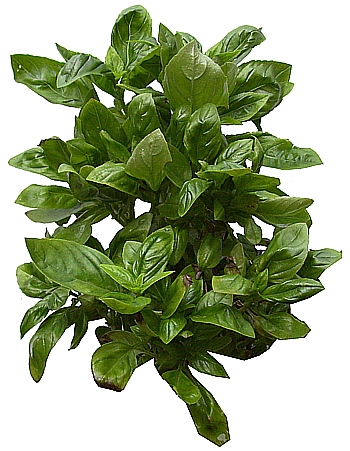 Basil Basil
Current Status: small plant
Uses:
- blood tonic.
- speech impediment cure.
- brain assist.
- cools fevers.
- Tacuinum Sanitatis Vienna. The Four Seasons of the House
of Cerruti:
Various plants
in the garden have this name and they all have hot and
dry natures, but in varying degrees. Choose leaves with
the sweetest perfume; it helps dissolve the brain's superfluities
and breeds strong blood.
- Hildegard von Bingen,
Physica:
A person who has
palsy in his tongue, so that he is unable to speak, should
place basil under his tongue, and he will recieve speech.
Also one who has strong fevers, should cook basil in wine,
with honey added. He should strain it and drink it frequently,
with or without food, and at bedtime. His fevers will
cease.
A person who has burning fevers should take asafoetida
and twice as much basil, and cook this in pure wine. He
should allow it to cool, and drink it daily while fasting,
both in morning and night when he goes to bed. He should
do this until he gets well.
A person who suffers from burning fevers should cook ficaria
or lesser celandine and twice as much basil, and cook
this in pure wine each day on an empty stomach, and at
night when he goes to bed. He should do this until he
is well.

|
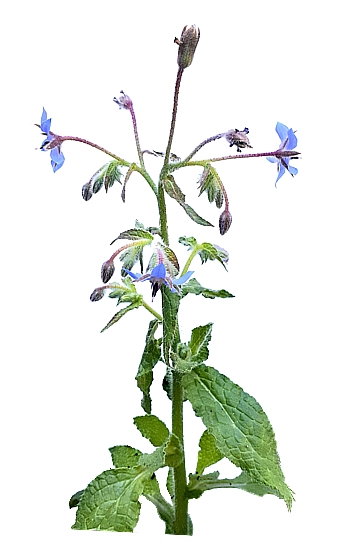 Borage Borage
Current
Status: self-seeded from last season, flowering
Uses:
- improves vision.
- cures tinnitus.
- chest decongestant.
- cures intestinal ulcers.
- assists with birthing.
- Hildegard von Bingen, Physica:
A person whose
vision is obscured should break borage into pieces and
smear it on a red, silk cloth. He should put it over his
eyes at night. If he does this often, the dimness will
go away from his eyes. It is not harmful to touch the
inside of the eyes with this ointment.
If the silk is white or green, he should put borage juice
on it, then smear it on felt, and wrap that around his
entire neck, over the back of his head, and up to his
ears, but not covering them. If he does this often, it
will stop his ears from ringing.
Anyone whose chest is congested should put a very little
borage in wine. The evil humours which harm the lungs
will go away.
But, if someone ails from intestinal ulcers, he should
take bran and heat it in a small dish with borage. He
should place it, so warmed, over his whole belly and navel,
and he will be cured.
- Trotula, On Treatments
for Women:
For birth of the
womb and for bringing out the afterbirth. Take root of
parsley, leaves of leek, and borage, and extract the juice,
and mix in a little oil, and give to the patient to drink,
and put vinegar into the vagina, and she will be freed.

|
|
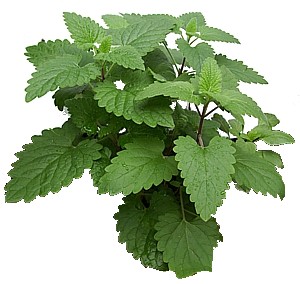
Catnip
Current Status:
established.
Uses:
- provokes love
The Distaff Gospels
says:
...when a woman
wants to be well loved by her husband or her lover, she
must give him catnip to eat: he will be so much in love
with her that he will not rest unless she is close to
him.

|
|
 Chamomile Chamomile
Current Status: seedling
Uses:
- handwash.
- purges menstruation.
- intestinal pain relief.
- stitch cure.
- scrofula cure with fox fat and egg yolk.
- Le Menagier de Paris:
To make water
for washing hands at table: Boil sage, then strain the
water and cool it until it is a little more than lukewarm.
Or use chamomile, marjoram, or rosemary boiled with
orange peel. Bay leaves are also good.
- Hildegard von Bingen,
Physica:
German chamomile
is hot, has a pleasant juice and is like a gentle ointment
for painful intestines. If one has pain in the intestines,
one should cook German chamomile with water and lard
or oil. He should add fine, whole wheat flour, and thus
make a porridge. He should eat it and it will heal his
intestines.
When women menstruate, they should eat or drink that
same porridge. It will gently provide a purgation of
mucus and internal fetid matter and bring on menses.
However a person who suffers a stitch should mix together
the juice of German chamomile with cow butter. He should
rub the area which hurts and he will be cured.
A person who has scrofula increasing on his body
should take the fat of a fox, and add to it less of
the fat of egg yolks. He should then mix chamomile in
these fats and heat it up in a small dish. Then he should
tie the chamomile over the scrofula with a cloth. When
these leaves have dried up, he should heat others up
in the same way and place them on the area. he should
do this for three days and nights, then annoint the
scrofula with the fats ... and it will vanish.

|
|
Chives
Allium schoenoprasum
Current Status:
established
Uses: not mentioned
in medieval manuscripts that I've found

|
|
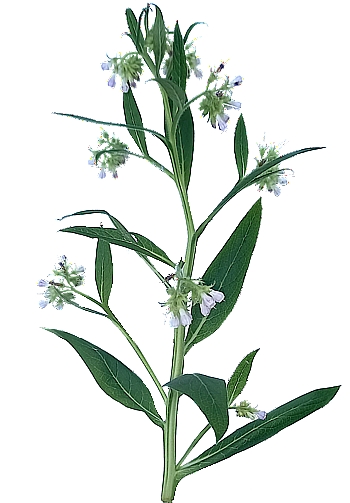 Comfrey Comfrey
Current Status:
small plant
Uses:
- intestinal injury.
- post-partum rupture.
- Hildegard von Bingen, Physica:
If some part of a person
is deficient, ulcerated or wounded, and he then eats
comfrey, it quickly pursues the mucus which is coming
out there, healing it as well as the ulcers on the surface
of the skin.
It does not heal ulcers within the body.
If the interior membrane, which encloses the intestines,
is cut by some accident, ivy and twice as much comfrey
should be cooked in good wine. After these herbs are
cooked, they should be taken from the wine. Then a bit
of pulverised zedoary, sugar equal to the amount of
zedoary, and some cooked honey should be added to the
wine and brought to a moderate boil. This should be
poured through a little sack, making a clear drink.
The ill person should drink this frequently, after food,
and at night. He should also place the herbs which were
cooked in wine over the place where the interior membrane
was ruptured. This draws together the torn places.
He should also cut comfrey root into minute bits and
place them in wine, so that it takes
their flavour. He should drink this wine often, until
he is healed.
- Trotula, On
Treatments for Women:
For rupture
of the lower parts after birth, take root of comfrey,
dry it and then pulverise it well, and put with fine
powder of cumin and also cinnamon in the vagina, and
it will be solidified.

|
|
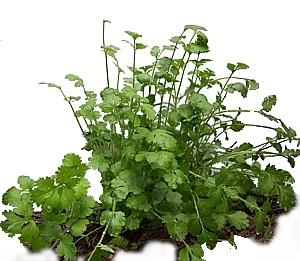 Coriander
or cilantro Coriander
or cilantro
Coriandrum savitum
Current Status:
small plant, reseeded
Uses: Although
mentioned by Hippocrates and Dioscorides and found in archaeologic
digs in macedonia from the Bronze age, it is not specifically
mentioned in medieval texts that I've found.
It may be known under another name or not used at all.
I love it.

|
|
 Dandelion Dandelion
possibly
also Sunnewirbel (Physica)
Current Status:
several plants
Uses:
(properties
attributed to Sunnewirbel: which may be either dandelion
or chicory or heliotrope or wild succory.)
- chest pain
- poor digestion
- Hildegard von Bingen, Physica:
... one who
has a pain in his chest, so that his voice is hoarse
from it, should take Sunnewirbel and an equal weight
of common burdock and cook these in pure wine. Then
he should strain this through a cloth and, at night,
having eaten, he should drink it frequently. His chest
and voice will feel better.
One who does
not digest properly, should take equal amounts of sunnewirbel
and common burdock and dry it in the sun or on a hot
tile. Then he should reduce it to a powder. To this
powder, he should add salt, a third as much as either
of the other ingrediants. Then, with honey, he should
make hydromel from it. He should drink this frequently
at night, when he has eaten. He will have digestion
at the proper time.

|
|
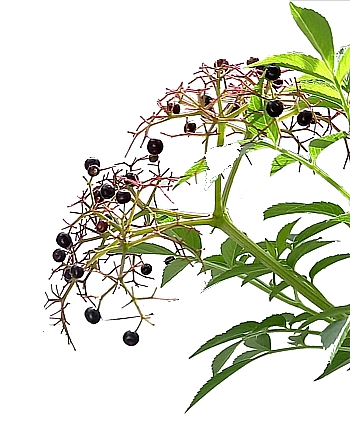 Elder Elder
Sambucus
nigra
Current Status:
several small trees
Uses:
- freckle banisher: Dwarf Elder water distilled.
- skin tonic: elderflower water.
- jaundice cure.
- fabric dye.
- Innsbruck Manuscript
from Germany, 1330:
One should take
elder and boil it in alumwater, that makes a green color
and also a black, if one mixes it with a bit of black
color.
Take the leaves of a dwarf elder and mash them and
take indigo and add thereto and grind it together and
let them dry together for a long time and take lime
water and let it seethe together and then take alum
and grind it thereto while it's all hot. Paint it on
white fabric, and it will become a good blue.
- Hildegard von Bingen,
Physica:
One who has
jaundice should enter a sauna bath and place the leaves
of this tree on hot rocks. he should pour water over
them, and then place a twig in pure wine so it takes
its flavour. While in that bath, he should drink this
in moderation. After he comes out of that bath, he should
lie in bed, so that he sweats. he should do this ofeten
and he will be better.

|
|
Fennell
Current status:
seeds
Uses:
- teeth whitener.
- breath freshener.
- aids digestion.
- clears eyes.
- childbirth pain relief.
- Hildegard von Bingen, Physica:
In whatever
way it is eaten, it makes a person happy ... and makes
his digestion good.
Eating fennel or its seeds every day diminished bad
phlegm and decaying matter, keeps bad breath in check
and makes ones eyes see more clearly.
Also, if a pregnant woman labours much in childbirth,
one should cautiously cook sweet herbs such as fennel
and asarum, in water. With the water squeezed out, they
should be placed, so warmed, around her thighs and back,
and be held there, gently tied on by a cloth. This should
ease the pain and cause her closed womb to more gently
and easily loosen.
A person who suffers from stinking breath- which passes
to the lungs-... sahould take galingale and fennel in
equal weights and twice the amount of both nutmeg and
feverfew. he should pulverise these, and mix these together.
He should eats two pennyweights of this powder with
a small mouthful of bread every day on an empty stomach.
- De Ornatu Mulierum
(About Women’s Cosmetics), attributed to Trotula de
Ruggiero:
The woman should
wash her mouth after dinner with very good wine. Then
she ought to dry very well and wipe with a new white
cloth. Finally, let her chew each day fennel or lovage
or parsley, which is better to chew because it gives
off a good smell and cleans good gums and makes the
teeth very white.

|
|
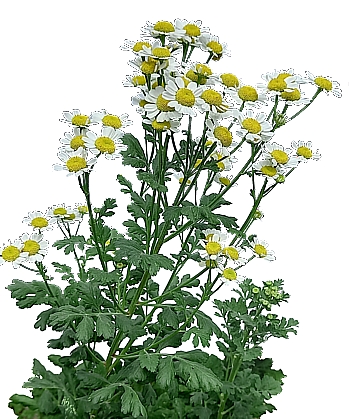 Feverfew
or Pellitory Feverfew
or Pellitory
bertram
Current Status:
established
Uses:
- general health tonic.
- eye health.
- Hildegard von Bingen, Physica:
It restores
health to an ill person whose body is almost completely
failing.
Eaten often, it expels pleurisy and provides a person
with pure humours. it gives him clear eyesight.
In whatever way it is eaten, whether dried or in food,
it is beneficial to both sick and healthy people.

|
|
 Garlic Garlic
Allium
sativum
Current Status: small plant/established
Uses:
- blemish remover.
- poison antidote, used warmed and dried.
- kills worms.
- cough soother.
- improves the voice.
- relieves dropsy.
- food to accompany red wine.
- Canterbury Tales, Chaucer:
Wel loved he
garleek, oynons, and eek lekes, And for to drynken strong
wyn, reed as blood
- Tacuinim Sanitatus,
Vienna, The Four Seasons of the House of Cerruti:
It is effective
against cold poisons, scorpion and adder bites: it kills
worms, clears the voice, and soothes chronic coughs.
It can damage the eyes and brain and to prevent and
remedy this, vinegar and oil are necessary. Pounded
in a mortar with black olives, as the Greeks do, garlic
is useful for dropsy sufferers.
- Hildegard von Bingen,
Physica:
For sick as
well as healthy people, garlic is more healthful to
eat than leeks. It ought to be eaten raw.

|
|
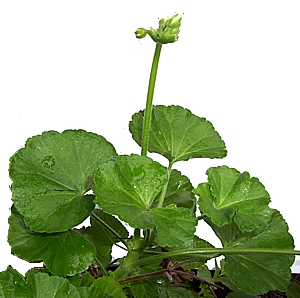 Geranium
or cranesbill Geranium
or cranesbill
Current Status:
small plant, flowering
Uses:
- treatment of kidney stones.
- melancholia treatment.
- weak heart.
- Hildegard von Bingen, Physica:
One who has
a stone in his body should take geranium and a little
less saxifrage and cook them in water. he should strain
this through a cloth and prepare a sauna. He should
also cook oats in water and pour that water over the
hot rocks. After he has sweated in the bath, he should
drink the water in which the geranium and saxifrage
were cooked. The stone will be gently broken up.
And one who has pain in his heart and is always sad
should take geranium, and less pennyroyal, and even
less rue and pulvarise it. He should often eat this
powder with his bread. His heart will be strengthened
and he will be happy.

|
|
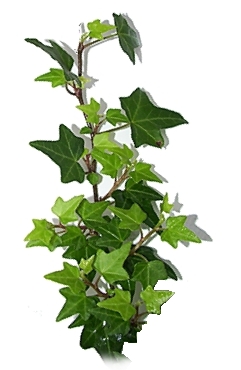 Ivy Ivy
Current Status:
small plant
Uses:
- soothes injuries.
- soothes burns.
- soothes insect bites.
- hair remover.
- Trotula (attributed)- on Women's Cosmetics:
In order to
permanently remove hair. Take ant's eggs, red orpiment,
and gum of ivy, mix with vinegar, and rub the areas.

|
|
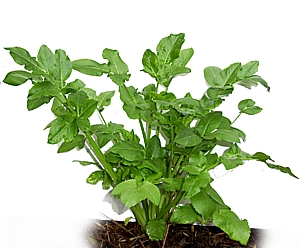 Lady's
Mantle Lady's
Mantle
Alchemilla vulgaris
Current Status:
Flowered profusely, then died back.
Uses:
- lessening menstrual flow. The astringent leaves were helpful
with profuse menstruation.

|
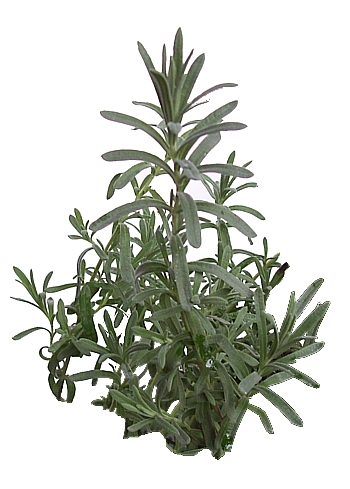 Lavender Lavender
Lavendula
vera
Current Status: died. Needs replacing.
Uses:
- linen scent, being stored with it or rinsed in lavender
water.
- lice deterrent.
- eye health.
- Hildegard von Bingen, Physica:
If a person with
many lice frequently smells lavender, the lice will die.
It's odour clear the eyes.

|
|
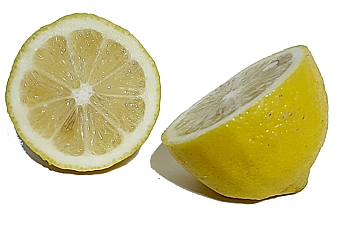 Lemon Lemon
Citra
Current Status:
small tree
Uses:
- kidney stone relief.
- reduces fevers.
- skin whitener.
- freckle remover.
- Tacuinim Sanitatus, Vienna, The Four Seasons of the House
of Cerruti:
They provide
limited nourishment but increase the flow of bile. A
syrup is made from the juice, which is useful for contagious
and pestilential fevers. A water distilled from lemons
which cures scabies and which women use, with much success,
to improve their appearance. Juice squeezed from bitter
lemons and drunk with Malmsey wine is effective in expelling
kidney stones.

|
|
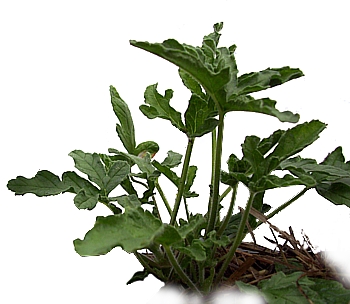 Lemon
geranium Lemon
geranium
Current Status:
medium plant
Uses:
Not mentioned specifically
as a seperate type of geranium in manuscripts that I've
found, although it may have been used under the heading
of geranium.

|
|
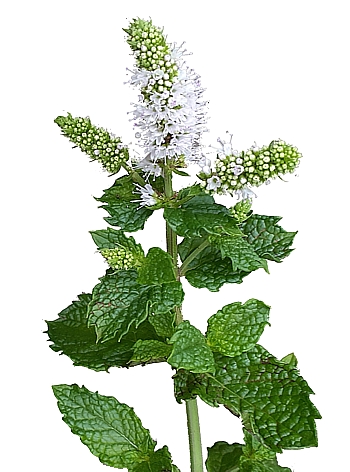 Mint Mint
Current Status:
Several plants
Uses:
- heats the blood
- revived after fainting
- stops a bleeding nose
- aids digestion
- cures hiccups
- anti-vomiting properties
- anti-curding properties
- stops runny eyes
- Tacuinim Sanitatus, Vienna, The Four Seasons of the House
of Cerruti:
Small plants
with thick leaves are preferable. It is good only when
the stomach has cold and moist temperaments, but it
is not good if one has a hot stomach, due to its hot
and dry nature, which heats the blood. Its scent will
revive the spirits of someone who has fainted. Added
to pomegranite wine, it cures hiccups and stops vomiting.
The water obtained from distilling the whole plant (and
the decoction should be quite strong) is a sure remedy,
taken as a drink, for a bleeding nose. If mint leaves
are put into milk, it will stop it from coagulating.
- Hildegard
von Bingen, Physica:
The mint, field
mint, which is called "lesser" is more hot
than cold. This should be pounded, and placed on the
eyes where there is a discharge, tied with a cloth.
One who... is unable to digest food should eat field
mint raw, or cooked with meats and fish. It will warm
his stomach, and provide good digestion.

|
|
Mustard
Current Status:
seed
Uses:
- appetite stimulant
- blood-thinner
- gout relief
- clears the eyes
- sciatica relief
- Tacuinim Sanitatus, Vienna, The Four Seasons of the House
of Cerruti:
The seeds of
the mustard plant are used to make a condiment, which
is served with food and stimulates the appetite wonderfully.
Because of its vapourous quality it sometimes penetrates
the nose unpleasantly, rising to the brain and causing
sneezing.
Mustard, which thins the blood, is useful mainly against
gout.
It is also useful against sciatica if mixed with figs
and applied to the affected area until it turns red
due to the very hot nature of mustard.
The harm that it may do the brain can be avoided by
preparing it with almonds and vinegar.
- Hildegard
von Bingen, Physica:
The herb itself
is harmful to eat... It destroys the insides of a person
who eats it. It's seeds flavour other foods. When eaten,
it makes the eyes clear but puts a vapour in the brain.
If it is not tempered by wine or vinegar, it is not
good for human consumption.

|
|
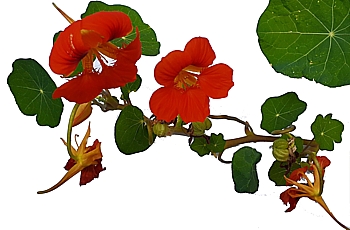
Nasturtium
Rucola masturcium
Current Status:
plants
Uses:
- arouses desire
- reduce urine
- kills worms (Vienna f.24v)
- increases sperm noticably
- Tacuinum sanitatis, Liege. folio 10:
Usefulness:
They increase coitus and sperm.
Dangers: They cause headaches.
Neutralisation of the dangers: With endive salad, lettuce
and vinegar.
- Tacuinum sanitatis,
Vienna, folio 24v:
Capers
Usefulness: They help the stomach and the appetite,
remove occlusions of the liver and of the spleen, and
kill worms.
Dangers: They are difficult to digest.
Neutralisation of the dangers: By cooking them with
oil, vinegar and aromatic spices.
Effects: They heat the blood and are more suited to
cold temperaments, old people, children, in Winter and
in cold regions. But, if prepared as described above,
they are good for all temperaments and ages and in every
region.
-
Tacuinum sanitatus, Vienna,
f 30v includes:
Augment
the sperm and coitus, causes migraines
- Tacuinum sanitatus,
Casanatense, f.LIV.:
Augments
the sperm and coitus but causes migraines
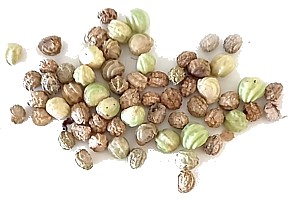

|
|
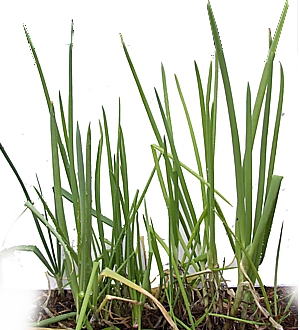 Onions Onions
Allium
cepa
Current Status: small plant
Uses:
- blemish remover when used with vinegar
- improves eyesight
- improves respiritory distress
- kills worms when steeped all night in springwater and
taken after morning fasting
- facillitates coitus
- increases semen
- bladder stimulant
- increases milk in nursing mothers
- Tacuinim Sanitatus, Vienna, The Four Seasons of the House
of Cerruti:
The most desirable
of the many varieties are the white ones, being rich
in watery juices. They generate milk in nursing mothers
and fertile semen in men. They improve the eyesight,
are softening, and stimulate the bladder. Headaches,
which are sometimes caused by onions, can be cured with
vinegar and milk. Those suffering from coughs, asthma,
and constrictions of the chest should eat boiled onions,
or onions baked in embers, served with sugar and a little
fresh butter.
- Tacuinum sanitatus,
Paris, folio 24v-
Nature: (according
to Rasis) warm in the fourth degree, moist in the third.
Optimum: The white ones which are watery and juicy.
Usefulness: They are diuretic and fecilitate coitus.
Dangers: They cause headaches.
Neutralisation of the dangers: With vinegar and milk.

|
|
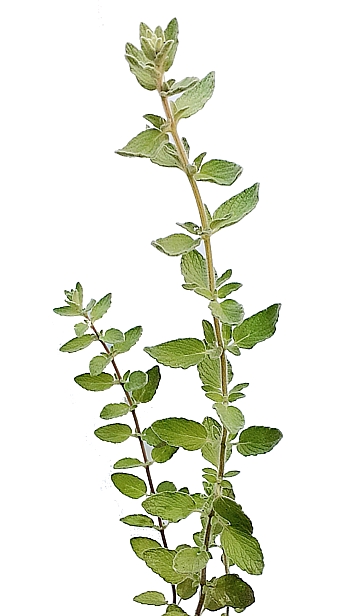 Oregano Oregano
Current Status:
established
Uses:

|
|
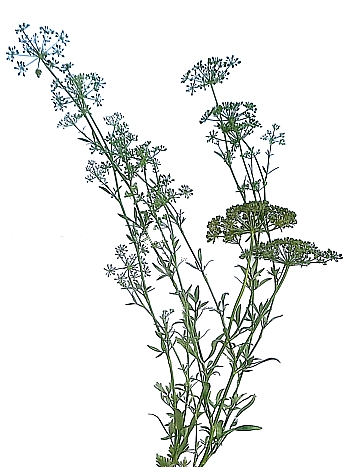 Parsley Parsley
Petroselinum crispum
Current Status:
established
Uses:
- head lice repellant
- menstruation assist: can bring about a late period.
- period pain relief.
- Tacuinim Sanitatus, Vienna, The Four Seasons of the House
of Cerruti:
It is good for
the health because it unblocks occlusions, helps the
bladder to function properly and relieves the discomfort
of the female period. It heats the blood and excessive
use also causes headaches.

|
|
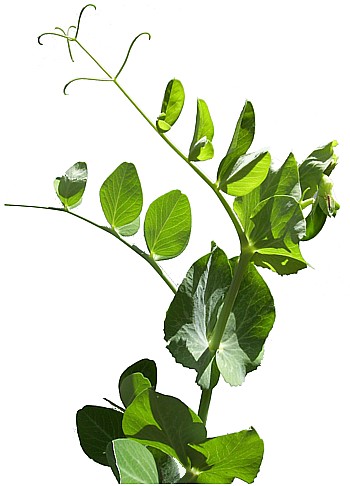 Peas Peas
Current Status:
seedling
Uses:
- food
- intestinal help
- Hildegard von Bingham, Physica:
They are not
good for the sicknesses of cold-natured people. Eating
peas produces much mucus in them...
If anyone has an ailment in his intestines, he should
often swallow a warm broth of peas and he will get better.

|
|
Raspberry
Current status:
near death but with new buds
Uses:
- berries for eating

|
|
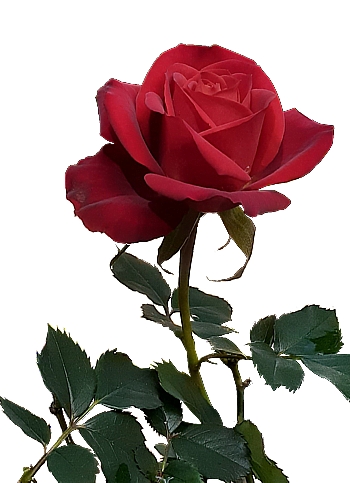 Rose Rose
Rosa
Current Status:
established
Uses:
- clothing scent.
- hair scent.
- brain tonic.
- Menagier de Paris gave directions for drying roses to
put among clothes:
Roses from Provence
are the best to put in clothing, but they should be
dried, and in mid-August sift them over a screen so
that the worms fall through the screen, and then spread
them in your clothes.
- Trotula gives the
following recipe for a scented powder to brush into the
hair:
But when she
combs her hair, let her have this powder. Take some
dried roses, clove, nutmeg, watercress and galangal.
Let all these, powdered, be mixed with rose water. With
this water let her sprinkle her hair and comb it with
a comb dipped in this same water so that [her hair]
will smell better. And let her make furrows in her hair
and sprinkle on the above-mentioned powder, and it will
smell marvelously.
- Tacuinim Sanitatus,
Vienna, The Four Seasons of the House of Cerruti:
They are beneficial
to the heated brain, although they sometimes cause heaviness
and dulling of the olfactory senses. This can be remedied
with camphor or saffron. Fresh roses from Persia are
the best.
- Hildegard von
Bingen, Physica:
One who is inclined
to wrath should take rose and less sage and pulverise
them. When wrath is rising in him, he should hold this
powder to his nostrils. The sage lessens the wrath and
the rose makes him happy. Rose, and hald as much sage,
may be cooked with fresh, melted lard, in water, and
an ointment made from this. The place where a person
is troubled by cramp or paralysis should be rubber with
it, and he will be better.
When it's (olive
tree) oil is first prepared, it is cooked on a fire,
and then roses and violets are put into it. Thus
it prevails against various fevers and, because it was
cooked on a fire, not necessary to leave in the sun
anymore.

|
|
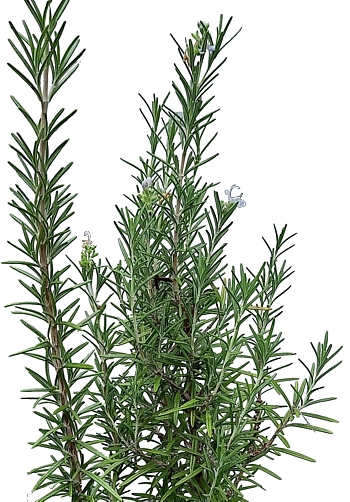 Rosemary Rosemary
Rosmarinus
officinalis
Current Status: established
Uses:
- face wash, mixed with white wine.
- antiseptic.
- handwash.
- symbol or fidelity and memory.
- used in funeral wreaths.
- sore mouth relief when used with mallow.
- Banckes' Herbal 1525:
boil the leaves
in white wine and wash thy face therewith, thy beard
and thy brows, and there shall no corns grow out, but
thou shall have a fair face.
- Le Menagier de Paris
says:
To make water
for washing hands at table: Boil sage, then strain the
water and cool it until it is a little more than lukewarm.
Or use chamomile, marjoram, or rosemary boiled with
orange peel. Bay leaves are also good.

|
|
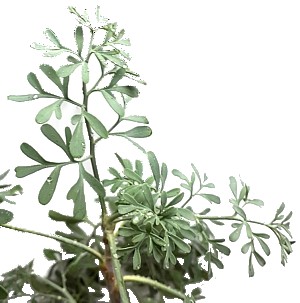 Rue Rue
Ruta graveolens
Current Status: plant
Uses:
- pimple cure when bruised and added to myrtle leaves and
being made up with wax.
- linen freshener to keep away bugs and noxious odors
- poison antidote
- removes lust
- helps watery eyes
- helps epilepsy
- encourages urine
- period bringer. Encourages the menses when late.
- Tacuinim Sanitatus, Vienna, The Four Seasons of the House
of Cerruti:
This plant is
an antidote for poisons and helps epileptics, yet it
causes headaches. The best place to grow is the shade
of a fig tree. It's virtues as an antidote are well-known
by the weasel who, it is said, prepares itself with
rue before going out snake hunting. Some believe it
has powers against spirits. Everyone knows, on Galen's
authority, that rue "extinguises the flames of
Venus."
- Hildegard von Bingen,
Physica:
A person whose
eyes water should take rue, and twice as much sage,
and twice as much chervil as sage. He should pound these
herbs a moderate amount, in a mortar, so they give out
a little bit of juice. Then he should dip these crushed
herbs in egg white. At night, when he goes to bed, he
should place this mixture oveer his forehead, all the
way to both temples.
A person who has black, turbulant eyes, so that sometimes
there is a cloud which fogs them in some way, should
take the sap of rue, and twice as much pure, liquid
honey, and mix them with good, clear wine. he should
put a crumb of whole wheat bread in it and tie it over
his eyes , at night, with a cloth.

|
|
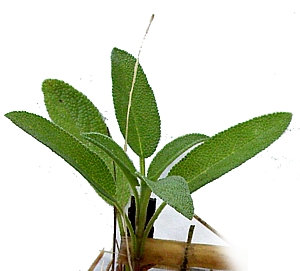 Sage Sage
Salvia officinalis
Current Status: small plant
Uses:
- alleviates gangrene used with rosemary and mallow.
- alleviates sore mouths.
- breath freshener.
- appetite enhancer.
- enhances pregnancy chances.
- handwashing.
- urinary incontinence.
- calms nerves.
- hair dye when made into a tea (Hortus sanitatis)
- removes dark colour from hair.
- aids mouth cancer when used with salt and vinegar.
- anti-perspirant- Le Menagier de Paris says:
To make water
for washing hands at table: Boil sage, then strain the
water and cool it until it is a little more than lukewarm.
Or use chamomile, marjoram, or rosemary boiled with
orange peel. Bay leaves are also good.
- Tacuinim Sanitatus,
Vienna, The Four Seasons of the House of Cerruti:
It is good for
the stomach and cold diseases of the nerves. It's digestion
is slow but can be speeded up with honey. We read that
if a woman who has slept alone for four days drinks
this and then has sexual relations, she will immediantly
become pregnant. To this end, women who survived the
plague in one town in Egypt were made to drink the juice
of sage leaves so the town could quickly be repopulated.
- Hildegard
von Bingen, Physica:
Anyone... who
has stinking breath, should cook sage in wine, strain
it through a cloth, and drink it often.
Someone who disdains eating should take sage, and a
little less chervil, and a bit of garlic, and pound
these together with vinegar, and so make a condiment.
he should dip foods he wishes to eat in it, and he will
have an appetitie for eating.
If anyone is unable to hold his urine because of the
coldness of his stomach, he should cook sage in water,
and strain it through a cloth. He should often drink
it warm, and he will be cured.
- Tacuinum sanitatis,
Liege:
Dangers: removes
dark colour from the hair.
Neutralisation of the dangers: With a rinse in which
there is some myrtle and oriental crocus.

|
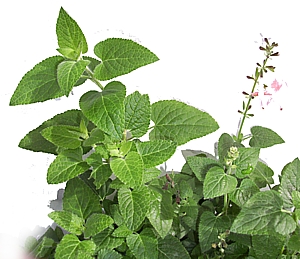 Salvia Salvia
Current Status: established
Uses:

|
|
Soapwort
Saponaria
officinalis.
Also known as bruisewort, dog cloves,
fuller's herb, latherwort
Current Status:
seed
Uses:
- cleaning cloth
- purgative in ginger
- stomach ache remedy
- originally grown in northern Europe until its introduction
to England by Franciscan and Dominican monks.
-Hildegard von Bingen, Physica:
But one whose
stomach is ill, should take parsley, and twice as much
fennel and as much soapwort as parsley and make a relish
from them. To this he should add butter or beef fat
and roasted salt and eat it often, cooked.
A person who is unable to digest the food he has just
eaten, should take two pennyweight of aristolochia,
one pennyweight of pimpernell juice, and a helf pennyweight
each of soapwort juice and ginger. He should mix fine
whole wheat flour with these juices and make little
cakes as wide as pennies, but a bit thick.He should
cook them in the sun or a nearly cool oven... the person...
should take one of these little cakes in the morning,
on an empty stomach.

|
|
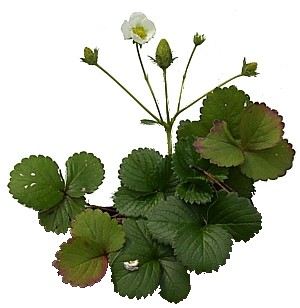 Strawberry Strawberry
Current Status: established
Uses:
- skin toner, juice or water removes redness
- removes spots or deformities of the skin and make it clear
and smooth
- Hildegard von Bingen, Physica:
They are beneficial
as food for neither a sick nor a healthy person because
they grow near the ground and, indeed, in putrid air.

|
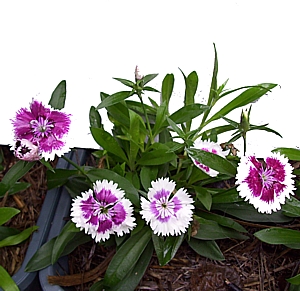 Sweet
William Sweet
William
Dianthus
Current Status: established
Uses:
- decorative
Not seen in any health manuals, but in illuminated borders
from the 15th century.

|
|
Violets
Current Status: established
Uses:
- decorative
- reduces fevers
- calms fits
- purges humours
- reduces pain in children
- herals lungs
- melancholia remedy
- Tacuinim Sanitatus, Vienna, The Four Seasons of the House
of Cerruti:
Keep in the
garden violets that are the colout of lapis lazuli:
the little plants with many leaves are the best. When
cooking them, boil lightly and briefly; the infusion
makes a vinegar that is wonderfully effective against
fevers accompanied by a parching thirst. The perfume
of violets calms fits; the drink purges humours; violet
water, obtained through distillation, is good for bodily
pains in young children. By nature a little cold and
moderately moist, the violet is suited to those with
warm, dry temperaments and can therefore aggravate catarrhs
brought on by harsh weather.
- The Goodman of Paris
says:
Know that I
take delight rather than displeasure in your cultivating
rose bushes, caring for violets and making chaplets,
and also in your dancing and singing; I wish you to
continue to do so among our friends and peers, for it
is only right and just that you should thus pass the
days of your maidenly youth.
- Hildegarde of Bingen,
Physica:
Anyone oppressed
by melancholy with a discontented mind, which then harms
his lungs, should cook violets in pure wine. He should
strain this through a cloth, ass a bit of galengale,
and as much licorice as he wants, and so make spiced
wine. When he drinks it, it will check the melancholy,
make him happy and heal his lungs.
But for one... whose body a swelling has risen up somewhere
after a fall or a blow, he should place violets in the
olive oil and annoint himself where it hurts. If there
is a swelling, he should annoint himself near it, but
not on it.

|
|
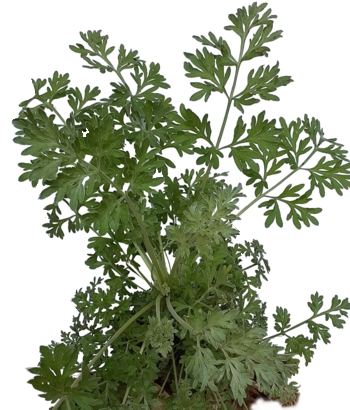 Wormwood Wormwood
Artemesia absynthum
Current Status: large plant
Uses:
- protects clothing from damage whilst in storage.
- moth repellant in woolen cloths.
- moth killer.
- liver tonic.
- kills worms.
- repels vermin in clothes when mixed with southernwood,
the leaves of a cedar tree and valerian.
- Tacuinim Sanitatus, Vienna, The Four Seasons of the House
of Cerruti:
Ellbochasim,
the scholar from Baghdad, states that the best wormwood
comes from Pontus; it has smaller leaves and flowers
than other wormwoods and is pleasantly aromatic, not
abominable-smelling like the others. He goes on to praise
the so-called Roman wormwood which did not actually
grow in the area around Rome or even Italy, but in Bohemia,
Hungary and Transylvania. It helps cold stomachs, is
good for obstructions of the liver, stimulated the apetitie
and kills worms. It heats and thickens the blood but
is an astringent. Its harmful effects can be remedied
with sugar, vinegar, herns and almond oil.
- Hildegard von Bingen,
Physica:
If a person
occasionally has a pain in his kidneys and loin... Then
that person should take equal parts of rue and wormwood,
and add a greater amount of bear fat, and pound these
together. He should vigorously rub himself with it,
around his kidneys and loins, while near the fire.

|
Copyright
© Rosalie Gilbert
All text & photographs within this site are the property of
Rosalie Gilbert unless stated.
Art & artifact images remain the property of the owner.
Images and text may not be copied and used without permission.
|